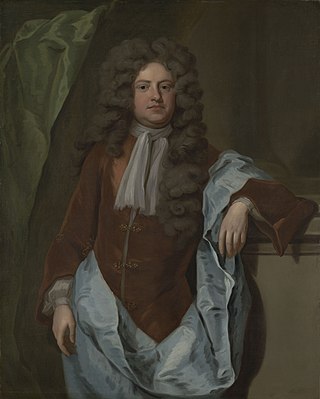
Charles Montagu, 1st Earl of Halifax,, was an English statesman and poet. He was the grandson of the 1st Earl of Manchester and was eventually ennobled himself, first as Baron Halifax in 1700 and later as Earl of Halifax in 1714. As one of the three members of the so-called Whig Junto, Montagu played a major role in English politics under the reigns of King William III and Queen Anne. He served as Chancellor of the Exchequer from 1694 to 1699 and as First Lord of the Treasury from 1714 until his death the following year. He was also president of the Royal Society and a patron of the scientist Isaac Newton.

Edward Montagu, 2nd Earl of Manchester, KG, KB, FRS was an important commander of Parliamentary forces in the First English Civil War, and for a time Oliver Cromwell's superior.
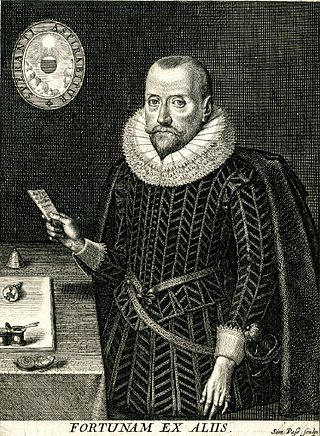
Sir Robert Naunton was an English writer and politician who sat in the House of Commons at various times between 1606 and 1626.
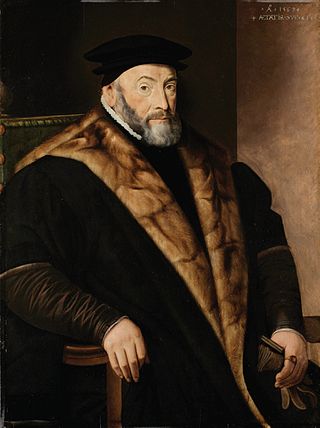
Thomas Audley, 1st Baron Audley of Walden KG, PC, KS, JP, was an English barrister and judge who served as Lord Chancellor of England from 1533 to 1544.

Edward Villiers, 1st Earl of Jersey was an English peer, courtier, and statesman of the Villiers family. He was created Baron Villiers and Viscount Villiers in 1691 and Earl of Jersey in 1697. A leading Tory politician opposed to the Whig Junto, he was made Southern Secretary in 1699.

Earl of Suffolk is a title which has been created four times in the Peerage of England. The first creation, in tandem with the creation of the title of Earl of Norfolk, came before 1069 in favour of Ralph the Staller; but the title was forfeited by his heir, Ralph de Guader, in 1074. The second creation came in 1337 in favour of Robert de Ufford; the title became extinct on the death of his son, the second Earl, in 1382. The third creation came in 1385 in favour of Michael de la Pole. The fourth creation was in 1603 for Lord Thomas Howard, the second son of Thomas Howard, 4th Duke of Norfolk, by his second wife Margaret Audley, the daughter and eventual sole heiress of Thomas Audley, 1st Baron Audley of Walden, of Audley End in the parish of Saffron Walden in Essex. Howard was a prominent naval commander and politician and served as Earl Marshal, as Lord Chamberlain of the Household and as Lord High Treasurer. In 1597 he was summoned to Parliament as Baron Howard de Walden, and in 1603 he was further honoured, at the start of the reign of King James I, when he was created Earl of Suffolk. His second son the Hon. Thomas Howard was created Earl of Berkshire in 1626.

Earl of Berkshire is a title that has been created twice in the Peerage of England. It was created for the first time in 1621 for Francis Norris, 1st Earl of Berkshire. For more information on this creation, see the Earl of Abingdon and also the Earl of Lindsey. The second creation came in 1626 in favour of Thomas Howard, 1st Viscount Andover. He was the second son of Thomas Howard, 1st Earl of Suffolk, second son of the second marriage of Thomas Howard, 4th Duke of Norfolk. His mother was Katherine, daughter of Sir Henry Knyvett of Charlton in Wiltshire. Howard had already been created Baron Howard of Charlton, in the County of Wiltshire, and Viscount Andover, in the County of Southampton, in 1622. These titles are also in the Peerage of England. Lord Berkshire succeeded to the Charlton estate through his mother in 1638. He was succeeded by his eldest son, the second Earl. He had already in 1640 been summoned to the House of Lords through a writ of acceleration in his father's junior title of Baron Howard of Charlton. He had no sons and on his death in 1679 the titles passed to his younger brother, the third Earl. He represented Wallingford in the House of Commons. He also died without male issue and was succeeded by his great-nephew, the fourth Earl. He was the grandson of the Hon. William Howard, fourth son of the first Earl. In 1745 he succeeded his third cousin as eleventh Earl of Suffolk. For further history of the titles, see the Earl of Suffolk.

Thomas Howard, 1st Earl of Suffolk, of Audley End House in the parish of Saffron Walden in Essex, and of Suffolk House near Westminster, a member of the House of Howard, was the second son of Thomas Howard, 4th Duke of Norfolk by his second wife Margaret Audley, the daughter and eventual sole heiress of Thomas Audley, 1st Baron Audley of Walden, of Audley End.

Theophilus Howard, 2nd Earl of Suffolk, was an English nobleman and politician.
Sir Henry Marten, also recorded as Sir Henry Martin, was an English judge and politician who sat in the House of Commons at various times between 1625 and 1640. He served as Judge of the High Court of Admiralty from 1617 to 1641.
Thomas Howard, 1st Earl of Berkshire was an English politician who sat in the House of Commons between 1605 and 1622. He was created Earl of Berkshire in 1626.
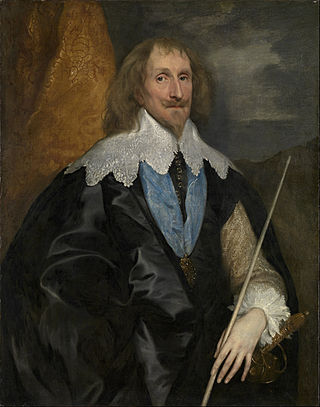
Philip Herbert, 4th Earl of Pembroke and 1st Earl of Montgomery, was an English courtier, nobleman, and politician active during the reigns of James I and Charles I. Philip and his older brother William were the 'incomparable pair of brethren' to whom the First Folio of Shakespeare's collected works was dedicated in 1623.
Buckinghamshire is a former United Kingdom Parliamentary constituency. It was a constituency of the House of Commons of the Parliament of England then of the Parliament of Great Britain from 1707 to 1800 and of the Parliament of the United Kingdom from 1801 to 1885.
Leonard Maw (sometimes seen as "Mawe" was a Bishop of Bath and Wells and a Master of Peterhouse, Cambridge and Trinity College, Cambridge.

John Preston (1587–1628) was an Anglican minister and master of Emmanuel College, Cambridge.
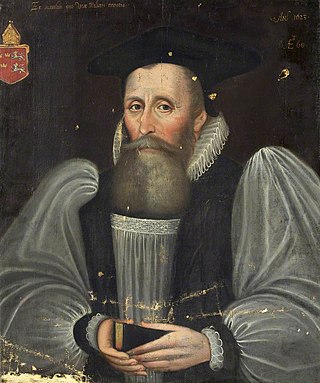
Nicholas Felton (1556–1626) was an English academic, the Bishop of Bristol from 1617 to 1619, and then Bishop of Ely.
Thomas Bainbrigg (Bainbridge) was an English college head.
Thomas Paske was an English clergyman and academic, deprived as a royalist.
Sir Robert Howard KB was an English landowner, member of parliament, and Royalist soldier. He was involved in a scandal when his mistress Frances Coke, Viscountess Purbeck, was found guilty of adultery and was twice summoned to explain her pregnancy with his son to the Court of High Commission. During the English Civil War, Howard was in command of the defence of Bridgnorth Castle when it surrendered to the Parliamentarians in 1646.
An election for the Chancellorship of the University of Cambridge was held on 25–27 February 1847, after the death of the Duke of Northumberland. Many senior figures in the university hoped that Prince Albert, the Prince Consort could be persuaded to stand and be elected unopposed, but a group from St John's College approached the Earl of Powis, a St John's man. The election became politicised as Powis was a noted Conservative and his opponents feared the consequences from the Whig Government if he was elected. The result was close as the large number of non-resident Members of the Senate from St John's, and Conservative supporters, backed Powis, but the Prince was elected and agreed to take up the post. The election occurred at a critical point in the history of the University when it was pressed to reform, and the Prince Consort's election allowed progress to be made.











